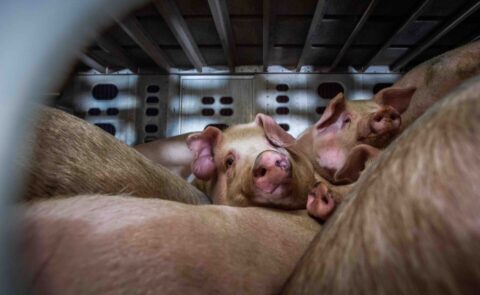Investigation
Meat Processing Plant Complaint Highlights Supply Chain Disruptions — And How the Meat Industry Isn’t Prepared
Food•4 min read
Perspective
When slaughterhouses shut down, producers had nowhere to send their animals. As a result, tens of millions of animals were killed and disposed of, posing a serious threat to humans and the environment.

Perspective • Food • Industry

Words by Mia MacDonald
This spring, U.S. meat corporations raised false fears of a “meat shortage.” While the supply crisis didn’t pan out, it did expose a much bigger problem designed by a small, consolidated, and powerful set of corporations.
With the White House and too many legislators willing to do the meat industry’s bidding, the foxes are guarding our hen houses with unjust, lethal and environmentally toxic consequences just so the six companies that control the majority of meat processing in the U.S. can keep reaping profits from churning out bacon, burgers, and nuggets.
It started with COVID-19 raging through the close, dangerous working conditions at slaughterhouses, where workers were denied basic protections and access to sick days and health care. As employees became sick, meat processing plants closed. But it didn’t last long. Powerful meat corporations and the Trump administration declared meat “essential” so processing plants could stay open during the pandemic. Centers for Disease Control guidelines were left up to the meat corporations to enforce, with voluntary personal protective equipment and social distancing protocols leading to dismal results.
As a result, at least 30,000 workers—mostly Black, Latinx, and immigrant—in meat processing plants have contracted COVID-19. More than 120 have died.
And when illness disrupted the supply chain, the industry’s slaughter model meant millions of animals growing past slaughter-weight couldn’t be “processed.” Because of corporate consolidation, when slaughterhouses shut down producers have nowhere to kill and process millions of animals.
As a result, tens of millions of pigs, piglets, chickens, chicks and cows, and calves are being euphemistically “depopulated” by gunshot, suffocation, blunt-force trauma or shutting off ventilation systems inside factory farms. That means widespread suffering alongside huge numbers of carcasses.
Mass depopulation poses an environmental catastrophe as animals are disposed of in landfills, incineration, burning on open pyres, composting, or other methods of burial with little, if any, public transparency. Disposal methods and sites aren’t publicly mapped despite the potential for contamination of soil and groundwater, pollution of habitats for wildlife, and human respiratory disease.
The proper disposal of animal carcasses in mass depopulation—especially during a pandemic—is essential to prevent the spread of disease. It’s also crucial to protect air and water quality.
Yet, despite huge amounts of taxpayer funds and other direct support handed out to these meat giants, there’s little evidence of meaningful federal oversight. An Environmental Protection Agency COVID-19 guidance note on depopulation admits, “Improper carcass management could lead to the need for environmental cleanups, as well as public concerns and the potential for future legal liability.”
The Center for Biological Diversity, Earthjustice and the Natural Resources Defense Council just filed a petition with the U.S. Department of Agriculture calling for it to provide environmental oversight and information vital to public health. The petition demands that the USDA prohibit the most environmentally harmful disposal practices, such as mass burial and incineration. It also calls for public access to disposal data related to depopulation as a result of COVID-19 closures.
Beyond averting untold environmental damage, implementing such measures will supply the public with essential information that is necessary to adequately protect against the increased risk of harm to public health created by these practices alongside COVID-19.
In addition, existing federal and state environmental and health regulations should be enforced. The Trump administration’s zeal to gut these protections hasn’t been lessened by COVID-19. But the meat industry must be held accountable for how mass “depopulation” is managed.
The tragedies unfolding can be addressed with a just, sustainable food system that protects workers, animals, and the environment, which must be a priority post-COVID, so the system failures we’re seeing now never happen again. Better enforcement of laws, as well as antitrust investigations to control the concentration of power, must be strengthened.
A shift towards diversified, decentralized, and shorter meat supply-chains would help fix this part of a broken food system and put Americans’ best interests back on the table. More immediately, Americans shifting to plant-forward ways of eating would also serve to break the meat industry’s grip on public policy and its super-sized appetite for power.